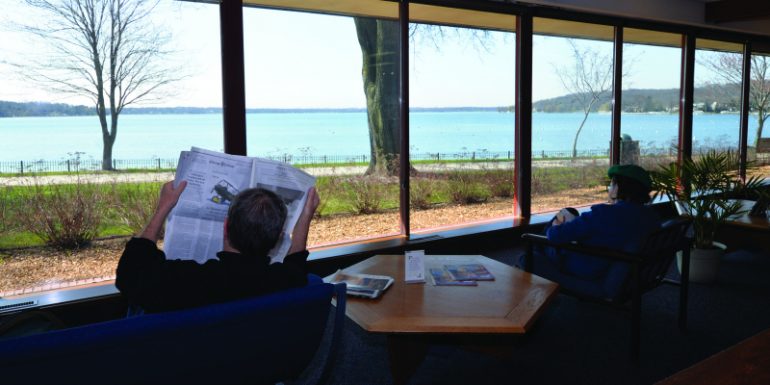By Margaret Sullivan
Everyone “thinks” they know what a library is. They visualize long rows of shelving warehousing books, audio books, DVDs, magazines, newspapers; lots of physical content. There are friendly people at a big desk, answering questions, explaining how to get online and of course checking out material. And there are a few patrons asking for help on how to use those banks of computers.
If this is your stereotypical image of a community library, you probably have asked, “Why are they relevant in today’s digital world?” For an answer, you could initiate a philosophical discussion with your smartphone by asking, “Are libraries relevant today?” And a sexy digital voice will respond, “I need more clarification.” With technology, the Internet, and an amazing array of devices overloaded with digital content, what is the function of libraries in our communities?
INFORMATION ACCESS
Equal access is the first function that intellectual freedom advocates will espouse. It is a very legitimate argument; access to information is a cornerstone of democracy. Not everyone can afford Internet service at home, or the computers and digital devices required for access. We are not all “digital natives” so even if you can afford it, many people do not want the hassle of making it work seamlessly. Libraries are free and the technology is ubiquitous, equipment gets updated often, and when their network goes down someone fixes it.
Access to physical content is just as important to many other users. Lake Geneva Public Library has a vast collection of feature films and complete seasons of cable programming not available elsewhere without fees. Tickets for an evening movie are often $10 or more. If you want a 3D experience in a lounge chair it is more like $20. Monthly subscriptions to cable or satellite television programming hovers around $100 depending on how “basic” you want to go.
And let’s just quickly mention the retail cost of books, audio books or music because those formats have long been available for free at the library. Today another format worth noting is Overdrive, a service available from either the Matheson Public Library in Elkhorn or the Lake Geneva Public Library, which provides downloads of content to read or for listening to personal, digital devices.
So libraries continue to maintain their critical role of the great equalizer for free access to information, literature and entertainment.
CRITICAL THINKING AND USING INFORMATION
But libraries are evolving. The American Library Association has a campaign focused on “Transformation.” All libraries whether school, university or public are transforming to meet the needs of the “Information Age.” Information literacy is a life skill students must learn and adults should fine tune throughout their lifetime. “Google-ing” your way through life is quite limiting. It works best if you only seek simple facts, the equivalent to being an expert at Trivia Pursuit. Too many people think a web search is somehow the same as research. It isn’t.
Novices can post anything they want online with minimal tools, knowledge or integrity. Wikipedia is an example of a huge database of information that is generally accurate yet is in a constant state of editing and development by anyone with an opinion. It is an okay place to start looking for information but if it is your only resource, be prepared for professional ridicule.
Libraries provide access to authentic and expensive databases of information. Learning to be critical thinkers and users of information is a key skill everyone must have to compete in a global society. Lisa Selje, library director at Elkhorn’s Matheson Memorial Library knows this concept well. This spring she hosted their annual consulting seminar on tax preparation, while looking ahead to a strategic plan to complement economic development in Elkhorn. “We are the county seat of government so we service the whole county. We have over 12,000 library card users in a community of 10,000 people. Business development is important here. Our goal is to develop content to encourage new business growth while still supporting our rural heritage,” she explains.
A COMMUNITY GATHERING PLACE
There is another interesting transformation going on in libraries. It involves community culture and enriching lives. Ray Oldenburg, an urban sociologist writes about the importance of informal, public gathering places. He calls them “The Third Place.” According to Oldenburg, home is your first place and work or school is the second place. People who only move between these two places are isolated, frequently over-worked and emotionally drained.
Oldenburg focuses on coffee shops, public gardens, cafes and pubs; visitors to contemporary libraries could make a serious case for libraries as the third place in our communities. Renovations made to all types of libraries recently have introduced or expanded soft seating areas, collaboration and meeting spaces, cafes, and community rooms.
A visit to the Lake Geneva Public Library places you in the middle of a landscaped park and gardens overlooking the lake. A more beautiful community gathering spot would be hard to find. The land was donated in 1894 by Chicago philanthropist Mrs. Mary Sturges contingent on the community maintaining the grounds and a library on this downtown lakefront site. In 1954 a Prairie-style library opened designed by Frank Lloyd Wright protégé, James R. Dresser. It was expanded in 1963 with community meeting and programming spaces.
The building, the grounds and Library Director Andrea Peterson all speak to the library’s role in inspiring lives. “Our mission really focuses on the humanities. We want people to learn more about life’s pleasures.” To that end, there are art and photography displays in the library, poetry reading events, guest speakers, Oscar movie nights, reading clubs and local author events.
PROGRAMMING UNIQUE TO EACH COMMUNITY
Partnerships with the local school district include programs to enhance literature classes and early childhood readiness. Young adult patrons can discuss and create graphic novel content in their Otaku Club. Children can don costumes like fairies or goblins and be caught up in a midsummer’s night dream. And families with toddlers can choose from a number of free story time events including an early evening “Pajama Story Time.”
Selje, like Peterson, looks to her community for direction on development of programming for the library in Elkhorn. Beyond the reading, crafts, school partnerships, arts, gender focused presentations, and genealogy programs, several others events like the Memory Café for Alzheimer’s patrons and the Literacy Council’s enrichment program for Spanish speaking patrons focus on specific local needs.
The Elkhorn library is growing both in size and content. “Our patrons are consuming more broadly,” says Selje. “We have to provide more content in more formats than ever before.” The newly renovated library converted their former reference collection room into a digital media room with walls lined with digital content. A modern, new addition flawlessly wraps the original building. In one of the new spaces, children’s programming features a castle backdrop. There is a goal this year to develop gardens on the library grounds for children and adults to cultivate as a complement to their summer theme of fitness.
Summers in local libraries are extremely busy with added programming for out of school children and young adults. There are innovative programs for adults looking for leisure-time enrichment. In addition, visitors to the area are always welcome and the library staff in Elkhorn and Lake Geneva are versed at answering local history questions as well providing ideas for exploring each community’s rich culture.





